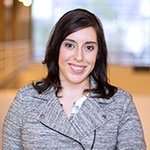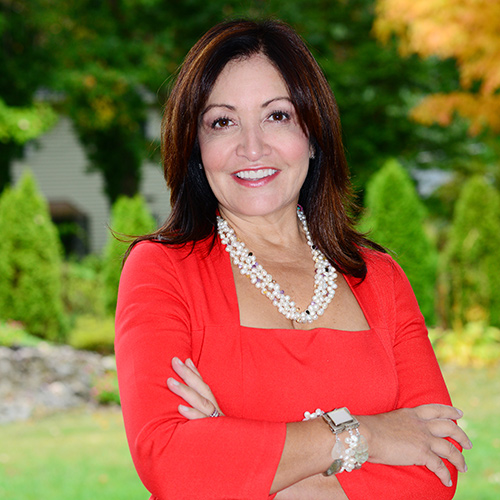When Rosalin Acosta entered the banking profession twenty-nine years ago, there were few Hispanic mentors or role models in the industry, especially in New England, where she has pursued her career. She’s now working to change that.
Acosta was raised in Union City, New Jersey, home to the USA’s largest Cuban community outside Miami. The Wesleyan University graduate has based her career in Massachusetts, having worked her way to leadership positions at Sovereign Bank and TD Bank before moving to Enterprise.
Today, she leads a multi-billion-dollar division of Enterprise Bank, Enterprise Investment Advisors (EIA). What makes her a great fit is her commitment to her community; more than 40 percent of EIA’s clients are nonprofit institutions, including colleges, foundations, hospitals, libraries, religious organizations, senior care centers, and museums. EIA helps these organizations grow endowment assets with diversified investment portfolios aimed at lowering risk and enhancing long-term performance.
Acosta’s Non-profit Titles
Co-Chair
Latino Executive Council
Board of Overseers
Milagros Para Ninos, Children’s Hospital, Boston, MA
Corporate Advisory Board
ALPFA
Committee Member
Latino Legacy Fund
Advisory Board Member
Merrimack Valley Workforce
Enterprise Bank was launched in the late 1980s after Massachusetts’s first high-tech boom had fizzled and a recession gripped the state. The founders were Merrimack Valley businesspeople who envisioned a local bank that would work to boost entrepreneurship in the region, which includes several older textile centers that slumped after American manufacturing jobs were moved overseas.
The now-shuttered textile mills in Lowell, Lawrence, and other Merrimack Valley communities once attracted immigrants from all over the globe. By mid-century, though, many textile operations had moved south or overseas, and joblessness in the region soared.
Cheap housing has lured the latest wave of American immigrants to the valley. As in many of New England’s former mill towns, the majority of new arrivals have been Latino. According to the 2010 Census, they make up 17.3 percent of the population in Lowell and 73.8 percent in Lawrence. Across the state, Latinos account for about 10 percent of the population.
“We’re not as populous here as you’ll find in Florida or the Southwest,” Acosta says. “But our percentage of the population growth is impressive. From 2000 to 2010, we saw a 46 percent growth in this state.”
In these mill towns, Latino immigration has helped revive downtowns that were left with vacant stores by the growth of malls and big-box retailers. Despite that entrepreneurship, however, Latino neighborhoods generally still struggle to catch up with the rest of the state, both economically and politically. Acosta donates her energy to organizations that can improve those statistics.
“I’ve spent a lot of time mentoring young people to help them get to a better place without having to put in all the years it took me to get there,” Acosta says.
Acosta chairs the corporate advisory board of the Association for Latino Profesionals for America (ALPFA), a national organization that works with college students and young people stepping into the business world.
“Access has always been a challenge for Hispanics,” she says. “Look at the number of Hispanics in executive positions. It’s very low. That’s why it’s so important that we have organizations like ALPFA. We’re focused on building tomorrow’s Latino leaders. Our programs include mentoring, networking, and connecting our members to C-suite executives.”
“Hispanics are entrepreneurial, and there has definitely been growth in Hispanic wealth,” Acosta says. “But the education gap is still an issue. We still have a high dropout rate among high school students. You can’t build tomorrow’s Hispanic leaders without education.”
In 2014, she and other Massachusetts professionals, including Aixa Beauchamp (p. 120) joined together to launch the Latino Legacy Fund, an organization created to advance the status of Latinos and enhance their community’s leadership capacity. In the same vein, Acosta serves on the Merrimak Valley Workforce investment board, a state-appointed panel charged with creating job opportunities in the area.
She’s also involved in health care as part of the Latino executive council at Boston Children’s Hospital, one of the world’s top medical institutions. Five years ago, the council founded Milagros Para Niños, which has so far raised $2.5 million to help fund a hospital-affiliated primary care center in Boston and to assist international families staying in hotels while their children receive treatment in the city.
Acosta’s professional résumé makes her a sought-after volunteer. “In my work, we’re always trying to solve a puzzle in the wealth space for our clients,” she says. “That’s the greatest way I can give back, by helping organizations and indviduals achieve their missions.”
She admits volunteer work and fundraising are not always easy. While Massachusetts is considered an affluent state, that is not always reflected in donations. “We have a lot of nonprofits with similar missions,” Acosta says. “That can make fundraising a challenge, especially if the economy isn’t strong.”
What’s more, she adds, Latino organizations across the country face a tougher struggle raising money. “In Massachusetts, only two cents of every donated dollar goes toward Latino organizations,” she says. “And in other parts of the country, it’s closer to one cent. There has been a lack of advocacy, but we are becoming more organized. More executives are getting involved.”
Her work with nonprofits has made her a well-known figure in Massachusetts. Recently, the Women of Harvard club named Acosta one of Boston’s most influential female leaders, and the Boston YWCA named her to their Academy of Women Achievers. Additionally, she is the recipient of the Abigail Adams Award, presented by the Massachusetts Women’s Political Caucus.
The mother of five hopes to see her children take up volunteering, too. “I believe strongly in setting an example for my kids,” she says. “I’ve let them know that life is not only about taking. I’m hoping to pass on that legacy of giving.”

